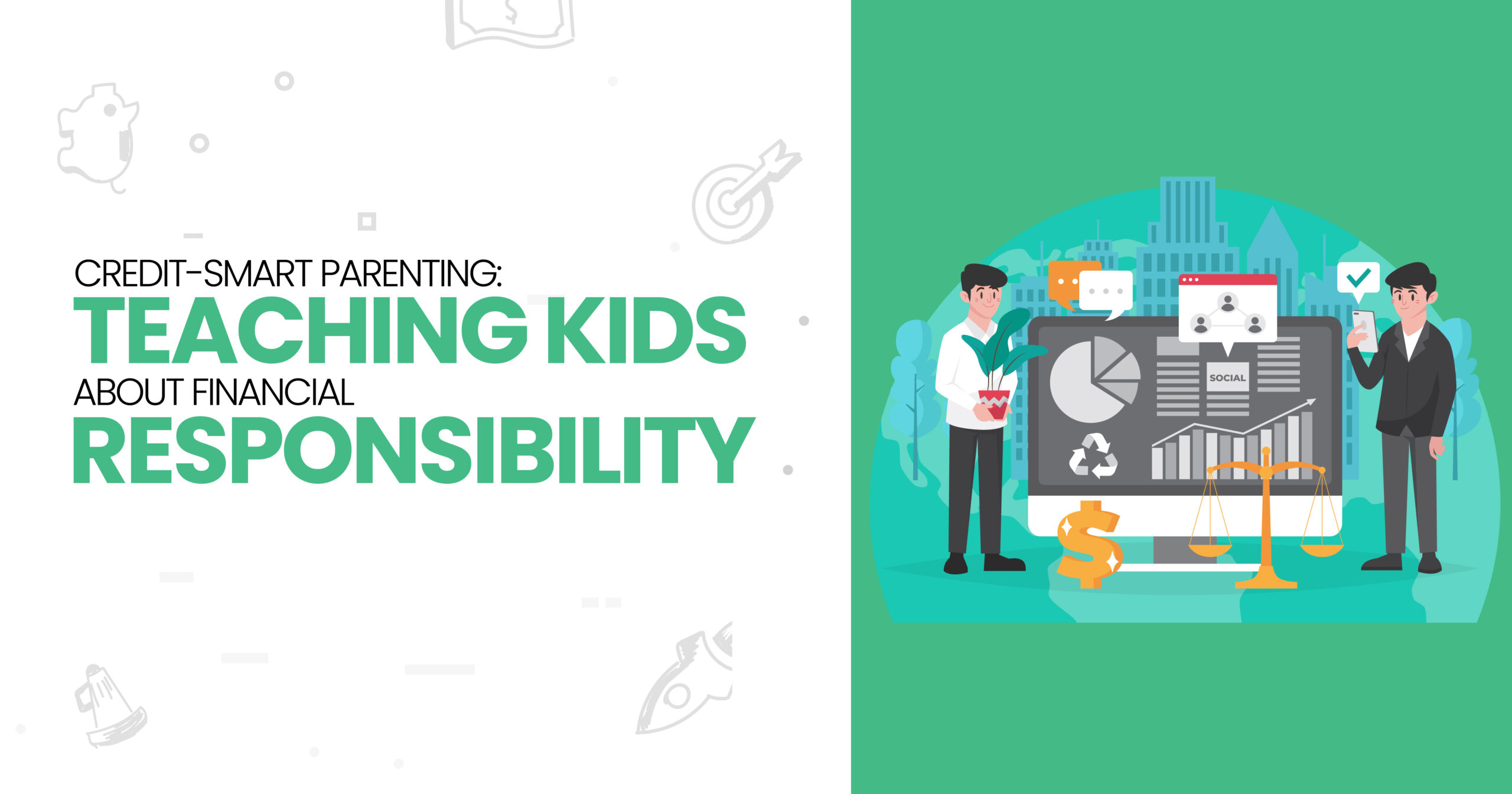Need help? Get in touch!

Credit-Smart Parenting: Teaching Kids About Financial
It is important to teach kids about financial responsibility from a young age. Learning to manage money wisely sets them up for success in the future. Handling finances properly leads to less stress and more security as adults. Parents should start discussing financial topics early, even as early as elementary school. Kids are naturally curious in money matters at a young age. Starting the conversation early allows concepts to be introduced gradually over many years. This helps financial skills and knowledge sink in.
Benefits
Raising kids to be financially savvy provides numerous benefits. They will be less likely to fall into debt or overspend. Kids also gain independence and confidence in their ability to budget and pay bills. Learning money management paves the way for future home buying, saving for retirement, and other big financial milestones. Understanding personal finance from a young age enhances overall wellness and stability.
Setting A Good Example
Children learn much about their money habits by observing their parents and caregivers. How adults handle finances and spend money provides an ongoing lesson—good and bad examples. Keeping expenses transparent shows kids it’s acceptable to discuss family funds. Parents who demonstrate responsible money management set the right tone. Things like paying bills on time, living within a budget, and avoiding excessive debt show kids how proper money behaviors work. Sticking to a spending plan yourself makes the rules easier to enforce.
Creating a monthly budget and resisting impulse purchases is a great way to be financially responsible. Listing expected income alongside expenses for necessities and discretionary spending keeps spending under control. Evaluation cuts down on emotional or last-minute extras that don’t fit the budget. Tracking where the money goes helps manage funds better now and recognizes patterns that could cause issues later if not addressed.
The Basics Of Money Management
Teaching kids basic financial principles early establishes an important foundation. Explaining core concepts in an age-appropriate way helps money lessons stick. Showing the value of earned money keeps kids motivated to contribute. Introducing the idea of income versus expenses lays the groundwork for the balancing act of personal budgets. Income sources like allowances or gifts provide money coming in.
Expenses encompass how funds flow out, whether through savings goals, donations, or purchases. Give kids a say in some spending by prioritizing needs and wants together. Needs are things required to live, like food and shelter. Wants are desirable extras, not required.
Budgeting basics prepare kids for independent life skills. Set spending limits for different categories to guide choices. Involve kids in savings decisions like putting aside money each week or month in labeled envelopes or jars for future goals. Monitoring progress builds financial management muscle memory. Tracking results keeps kids invested in the process of monitoring money in and money out.
Teaching Kids About Credit
Credit refers to borrowing money that must be paid back with interest. Discuss how credit cards work and why avoiding late fees is important by paying the full balance each month. Explain how making only minimum payments results in paying more over time. Help kids understand credit reports and scores. What goes into determining their number, and how can it impact big purchases and loans in the future? Late or missed payments hurt, while on-time payments help over the long run.
Interest is what lenders charge to borrow money. Explain variable rates may go up while fixed rates lock in a set amount. Fees for balance transfers, cash advances, or penalty APR differ per card. Look for no annual charge cards when they’re old enough for a secured card with parent oversight. Using credit for small regular expenses like lunch keeps utilization low, which benefits the score. Check statements closely to catch mistakes or fraud. Together, we go over terms so kids fully understand before handling credit independently later in life.
Opportunities For Earning And Saving
Providing ways to earn money teaches kids its value from an early age. Giving age-appropriate chores around the house with a small payment attached gives purpose. Babysitting or mowing lawns in the neighborhood are more independent options as kids grow.
Saving should also start young. Explain why it’s smart to set aside some earnings to prevent instant spending habits. Putting a percentage of job income regularly into savings is a worthwhile habit. Seeing balances increase over time through interest, even in small amounts, builds motivation to save more.
Introducing basic investment strategies early doesn’t mean kids must become stockbrokers overnight. Describing how earning interest or market growth over decades leads to larger totals tomorrow makes the concept accessible. Hands-on options include investing allowance funds or gig money with parent guidance into low-fee index funds matching goals. Watching small investments develop a larger total keeps kids engaged in long-term financial planning.
Handling Money In The Digital Age
Much of our financial lives have moved online. Kids must understand both the benefits and risks associated with digital money management. Reviewing online banking capabilities with parents allows children to grasp the tools available and appreciate the convenience.
Online spending poses new challenges. Explain the potential dangers of scams, phishing attempts, or third-party sites collecting personal data. Review privacy settings together and limit what’s posted publicly. Warn never to send money or information to unfamiliar people via email, texts, or social media. Practice discernment, but don’t discourage technology use – emphasize digital safety nets.
When kids have online payment apps, clear rules should be set, and single transaction amounts and total monthly spending should be limited to prevent issues. Review statements for accuracy. As with physical cards, emphasize only buying items already budgeted to avoid debt. Discussion keeps lines of communication open when navigating evolving technologies and teaches responsible digital habits early on.
Learning From Mistakes
Mistakes are inevitable when learning new skills like money management. Talk to children about viewing errors not as failures but as opportunities. Encourage small, supervised financial risk-taking that allows experimenting without severe consequences. When mistakes do happen, make the learning process positive. Discuss what went wrong without judgment to understand why a decision resulted in an unintended outcome. Brainstorm how to avoid similar issues going forward. Praise efforts to remedy situations rather than punish for human errors.
The focus should be on learning from experience, not dwelling on failure. Discuss managing errors by admitting when wrong, accepting responsibilities, and creating a plan of action. Over time, mistakes typically become less frequent as concepts solidify. The goal is nurturing comfort in discussing money openly and reinforcing financial cooperation versus secrecy and resentment that could arise from harsh penalties alone. Mistakes are a natural teacher when handled correctly.
Involving Kids In Family Finances
Household financial discussions illustrate real-world budgeting applications. Explain the family income sources and expenses at an appropriate level. Establish an allowance system connected to family financial responsibility. Extra chores around support of household upkeep teach the value of contributions. Consider assigning kids a role like tracking certain utility costs to foster engagement.
Disagreements will happen even in strong family units – practicing respectful conflict resolution regarding funds empowers kids. Hearing all perspectives promotes cooperation, critical for future cooperative living situations or marriages. Have children participate in periodic financial reviews half-jokingly called “family meetings” to solidify lessons.
Conclusion
Teaching children good financial habits from an early age through open communication, positive role modeling, and involvement in age-appropriate money management skills will serve them well for life. Starting early allows principles of earnings, spending, saving, and responsibility to take hold naturally over the years through learning from successes and mistakes. With guidance, kids can develop lifelong money smarts, empowering wise choices for their future financial independence and well-being.
related post
- Located in Pembroke Pines, FL
- FICO is a registered trademark of Fair Isaac Corporation in the United States and other countries. Pines Credit Pros does not offer legal advice and is not a substitute for legal services. Pines Credit Pros does not guarantee the permanent removal of verifiable tradelines or make promise(s) of any particular outcome whatsoever. Pines Credit Pros requires active participation from its clientele regarding requested documents and information, including investigation results, for the sought-after outcome of a healthy, accurate credit report. Individual results may vary.






